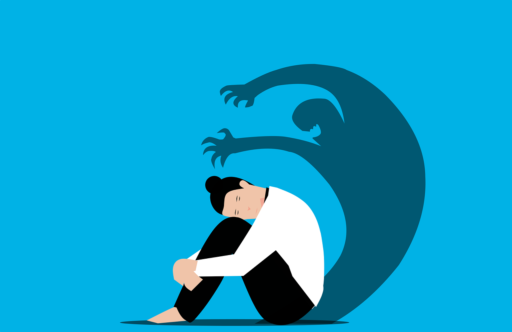You wake up in the morning, just like any other day, but there’s an unexplainable unease gnawing at the corners of your mind. You can’t quite put your finger on it, but something feels off, like a hidden shadow lurking in the depths of your being. As you navigate through your daily routine, this sense of unease intensifies, making you question your own sanity and well-being.
Why do you feel like something is wrong with you? This internal struggle is all too familiar and, rest assured, you are not alone. In this article “Why Do I Feel Like Something Is Wrong With Me”, we will explore the various reasons behind this unsettling feeling and provide some insights on how to navigate through it with empathy and self-care.
Possible Physical Causes
Hormonal Imbalance
Feeling like something is wrong with you could be attributed to a hormonal imbalance in your body. Hormones play a crucial role in regulating various bodily functions, including mood and emotions. An imbalance in hormones, such as estrogen, progesterone, or thyroid hormones, can lead to feelings of anxiety, depression, or general discomfort. It is important to consult with a medical professional to determine if a hormonal imbalance might be contributing to your emotional state.
Thyroid Dysfunction
The thyroid gland produces hormones that help regulate metabolism, energy levels, and mood. Dysfunction in the thyroid gland, such as an overactive or underactive thyroid, can disrupt the balance of hormones in your body and result in feelings of unease, anxiety, or depression. If you suspect that your thyroid might be contributing to your emotional state, it is recommended to consult with a healthcare provider for proper evaluation and treatment.
Nutrient Deficiencies
Your emotional well-being can be influenced by your nutritional intake. Deficiencies in essential nutrients, such as vitamins, minerals, or omega-3 fatty acids, can impact mood stability and overall mental health. For example, low levels of vitamin B12 or folate have been linked to depressive symptoms. It is important to maintain a healthy and balanced diet, and if necessary, consult with a healthcare provider to assess for any nutrient deficiencies and consider appropriate supplementation.
Chronic Pain or Illness
Living with chronic pain or illness can take a toll on your mental and emotional well-being. Dealing with persistent physical discomfort or experiencing limitations due to an ongoing illness can lead to feelings of frustration, sadness, or even depression. Emotional support and proper pain management strategies are crucial in managing these complex emotions. Consulting with a healthcare provider who specializes in pain management or seeking support through therapy can be beneficial in coping with the emotional impact of chronic pain or illness.
Mental Health Factors
Anxiety Disorders
Anxiety disorders encompass a range of conditions, such as generalized anxiety disorder, panic disorder, and social anxiety disorder. These disorders can cause excessive worry, fear, and discomfort in various situations, making you feel like something is wrong with you. Seeking professional help from a therapist or psychiatrist can help uncover the underlying causes of anxiety and develop effective coping strategies.
Depressive Disorders
Depression is a mood disorder characterized by persistent feelings of sadness, hopelessness, and a lack of interest in activities. If you often feel like something is wrong with you, it could be a sign of a depressive disorder. Depression can have various causes, including genetics, life events, or imbalances in brain chemicals. Seeking professional help is vital in treating depressive disorders, and a combination of therapy, medication, and lifestyle changes may be recommended for effective management.
Obsessive-Compulsive Disorder
Obsessive-Compulsive Disorder (OCD) is a mental health condition characterized by intrusive thoughts that lead to repetitive behaviors or mental rituals. If you frequently experience unwanted thoughts or engage in ritualistic behaviors that you find difficult to control, it might contribute to the feeling that something is wrong with you. Consulting with a mental health professional who specializes in OCD can help diagnose and develop a personalized treatment plan.
Post-Traumatic Stress Disorder
Post-Traumatic Stress Disorder (PTSD) can occur after experiencing or witnessing a traumatic event. Symptoms may include intrusive thoughts, flashbacks, nightmares, and emotional distress. If you have been through a traumatic experience and feel like something is wrong with you, it could be a sign of PTSD. Seeking professional help from a therapist who specializes in trauma can assist in processing the event and finding coping mechanisms to alleviate distress.
Psychotic Disorders
Psychotic disorders, such as schizophrenia, can cause distorted thoughts, hallucinations, and impaired functioning. If you experience symptoms like psychosis, you might feel like something is wrong with you. These disorders often require comprehensive treatment plans involving therapy, medication management, and support from mental health professionals.

Psychological Factors
Low Self-Esteem
Low self-esteem can contribute to feelings of inadequacy, self-doubt, and a constant belief that something is wrong with you. Negative self-perception can stem from various factors, such as childhood experiences, societal pressures, or internalized criticism. Working with a therapist can help address and challenge negative thoughts, improve self-esteem, and foster a healthier self-image.
Negative Thinking Patterns
Engaging in negative thinking patterns, such as catastrophizing or overgeneralizing, can intensify feelings of unease and the belief that something is wrong with you. Cognitive-behavioral therapy (CBT) can assist in identifying and reframing these negative thoughts, promoting a more positive and realistic mindset.
Perfectionism
The pursuit of perfection can be exhausting and often leads to self-criticism and constant dissatisfaction. Perfectionistic tendencies can contribute to the feeling that something is wrong with you because nothing ever seems good enough. Therapy can help challenge perfectionistic thinking patterns and develop more realistic expectations.
Fear of Failure or Rejection
The fear of failure or rejection can cause significant distress and impact your self-perception. This fear can lead to avoidance of opportunities or situations, leaving you with a lingering belief that something is wrong with you. Exploring these fears with a therapist can help identify their origins and develop strategies to overcome them, leading to increased self-confidence and well-being.
Emotional Causes
Unresolved Trauma
Unresolved trauma from past experiences, such as abuse or loss, can have a profound impact on your emotional well-being. If you have experienced trauma and feel like something is wrong with you, it is essential to seek support from a trauma-informed therapist who can guide you through the healing process.
Grief and Loss
Navigating through the grieving process after losing a loved one can be emotionally challenging. Feelings of sadness, emptiness, or confusion may arise, making you question why you feel like something is wrong with you. Grief counseling or therapy can provide the necessary support and tools to cope with loss and facilitate the healing process.
Relationship Issues
Difficulties or conflicts within your relationships, whether romantic, familial, or friendships, can cause emotional distress and the belief that something is wrong with you. Seeking couples or family therapy can help address underlying issues and improve communication, fostering healthier and more fulfilling relationships.
Loneliness and Isolation
Feelings of loneliness and isolation can often lead to self-doubt and the belief that something is wrong with you. Humans have an innate need for connection and belonging, and lacking these can impact your emotional well-being. Engaging in social activities, reaching out to supportive friends or family, or seeking counseling can help combat loneliness and improve your sense of self-worth.

Environmental Influences
Stressful Living or Work Conditions
Living or working in high-stress environments can take a toll on your mental and emotional well-being. Constant exposure to stressors without adequate support or coping mechanisms can lead to feelings of overwhelm and the belief that something is wrong with you. Seeking stress management techniques, setting boundaries, and considering change in living or work conditions can help alleviate these pressures.
Toxic Relationships
Being in toxic or abusive relationships can deeply affect your emotional state. Constant criticism, manipulation, or lack of support can lead to low self-esteem and the belief that something is inherently wrong with you. It is crucial to prioritize your well-being and seek support from loved ones or professionals to navigate through these difficult relationships.
Financial Problems
Financial difficulties, such as debt or unemployment, can cause significant emotional distress. Constant worries about money can lead to feelings of inadequacy or the belief that something is wrong with you. Seeking financial guidance, exploring budgeting strategies, and reaching out to relevant support services can help alleviate the burden and reduce the impact on your emotional well-being.
Imposter Syndrome
Constant Self-Doubt
Imposter syndrome refers to the persistent self-doubt and fear of being exposed as incompetent, despite evidence of accomplishments and capabilities. If you frequently doubt your abilities or achievements, it can contribute to the feeling that something is wrong with you. Recognizing imposter syndrome and working with a therapist can help challenge these irrational thoughts and build self-confidence.
Feeling Like a Fraud
Imposter syndrome often involves feeling like a fraud, believing that your achievements are merely a result of luck or deception rather than genuine competence. This can create an ongoing belief that something is wrong with you. Exploring these feelings with a therapist can provide valuable insights into your self-perception and help develop a healthier perspective.
Fear of Being Exposed
Imposter syndrome is often accompanied by a persistent fear of being exposed as inadequate or not belonging in specific roles or environments. This fear can reinforce the belief that something is inherently wrong with you and undermine your self-confidence. Therapy can assist in challenging these fears and building resilience against imposter syndrome.

Social Media Comparison
Unrealistic Beauty Standards
Social media platforms often promote unrealistic beauty standards, showcasing filtered and perfectly edited images that can lead to comparisons and feelings of inadequacy. Constant exposure to these images can contribute to the belief that something is wrong with you. It is crucial to remember that social media presents a curated version of reality, and focusing on self-acceptance and self-care can help combat the negative impact of unrealistic beauty standards.
Peer Pressure
Feeling pressured to conform or meet certain expectations set by peers can greatly impact your emotional well-being. Peer pressure can make you feel like something is wrong with you if you don’t align with societal norms or the behaviors of those around you. Developing a strong sense of self and surrounding yourself with supportive individuals who appreciate and value you can help counteract the negative effects of peer pressure.
Fear of Missing Out (FOMO)
Constant exposure to others’ highlight reels on social media can also instill a fear of missing out (FOMO). Believing that others are leading more exciting lives or achieving more can create a sense of inadequacy in yourself. Cultivating a balanced attitude toward social media and focusing on your own personal growth and experiences can help alleviate the impact of FOMO and reduce the feeling that something is wrong with you.
Lack of Purpose or Meaning
Feeling Stuck in Life
The absence of clear goals, direction, or a sense of purpose can contribute to the belief that something is wrong with you. Feeling stuck in life can lead to frustration, dissatisfaction, or a sense of unfulfillment. Reflecting on your values, interests, and exploring new opportunities or passions can help regain a sense of purpose and direction.
Lack of Goals or Achievement
Not having defined goals or feeling unaccomplished in various areas of life can create a sense of emptiness and the belief that something is wrong with you. Setting realistic goals, both short-term and long-term, can provide a sense of purpose and fulfillment. Working with a therapist or coach can assist in identifying and achieving these goals, strengthening your confidence and motivation.
Existential Crisis
Existential crisis refers to a period of intense reflection and questioning about the meaning and purpose of life. If you find yourself asking profound existential questions and feeling existential anxiety, it can contribute to the feeling that something is wrong with you. Engaging in existential therapy or philosophical discussions can help navigate these deep inquiries and find personal meaning within life’s uncertainties.
Cultural and Societal Influences
Internalized Stigma
Internalized stigma refers to the internalization of negative societal beliefs or stereotypes surrounding mental health or certain identities. If you have internalized these stigmas, it can lead to self-judgment, shame, and the belief that something is wrong with you. Challenging and deconstructing these internalized beliefs through therapy, education, and support from understanding communities can promote self-acceptance and well-being.
Cultural Expectations
Cultural expectations can heavily influence your beliefs and attitudes towards yourself. Conforming to cultural norms that are incongruent with your identity or personal values can foster the belief that something is wrong with you. Embracing your individuality, seeking cultural support systems, and working with a therapist who understands cultural dynamics can aid in navigating the complexity of cultural expectations.
Societal Pressure
Societal pressure, such as expectations around career, relationships, or societal roles, can create immense stress and make you feel like something is wrong with you if you don’t align with these expectations. Recognizing that societal standards are often arbitrary and individual happiness should be prioritized can help alleviate the impact of societal pressure on your self-perception.
Seeking Professional Help
Therapy and Counseling
Seeking therapy or counseling is a proactive step towards addressing the belief that something is wrong with you. A therapist can provide guidance, support, and tools to help identify and work through underlying causes contributing to these feelings. Therapy offers a safe space for self-exploration, understanding, and developing coping strategies.
Medical Evaluation
If you suspect physical causes, such as hormonal imbalances or thyroid dysfunction, it is important to consult with a healthcare provider for proper evaluation and necessary medical interventions. A comprehensive assessment can help identify any underlying physical conditions that might be contributing to your emotional state.
Support Groups
Joining support groups, whether in-person or online, can provide a sense of community and validation. Interacting with others who share similar experiences can help normalize your feelings and alleviate the belief that something is wrong with you. Support groups can offer empathy, understanding, and shared coping strategies.
Medication Management
In some cases, medication may be necessary for managing certain mental health conditions. If recommended by a healthcare professional, medication can help alleviate symptoms and provide relief. It is important to work closely with a healthcare provider to ensure proper medication management and monitor any potential side effects.
In conclusion Why Do I Feel Like Something Is Wrong With Me
Feeling like something is wrong with you can stem from various physical, mental, emotional, psychological, environmental, and societal factors. It is crucial to approach these feelings with empathy and seek professional help when needed. Remember that you are not alone, and there are resources available to support you on your journey towards emotional well-being and self-acceptance.
Frequently Asked Questions
Q1: Why do I feel like something is medically wrong with me?
Feeling like something is medically wrong can be linked to health anxiety, a condition where individuals worry excessively about their health. Consulting a healthcare professional can provide reassurance and guidance.
Q2: Why do I think that there is something wrong with me?
Various factors, including stress, anxiety, or underlying health concerns, can contribute to the perception that something is wrong. It’s essential to address these concerns with a healthcare provider for accurate assessment.
Q3: Why do I feel like something is wrong randomly?
Random feelings of unease or concern may stem from anxiety or heightened stress levels. Exploring coping mechanisms and seeking professional support can help manage these sensations.
Q4: Is there something mentally wrong with me?
Feeling that something is wrong mentally may be indicative of mental health challenges. Consulting with a mental health professional can provide insights and support for addressing these concerns.
Q5: Can your brain create false symptoms?
Yes, the brain can create sensations that mimic physical symptoms, especially under stress or anxiety. This phenomenon is known as psychosomatic symptoms. Seeking guidance from a healthcare provider is crucial for accurate evaluation.
Q6: What are signs something is wrong with your body?
Persistent or unusual physical symptoms, changes in bodily functions, and unexplained discomfort may be signs that warrant medical attention. Consulting with a healthcare professional is recommended for proper assessment.
Q7: Why can’t I think clearly anymore?
Difficulty in clear thinking can be linked to various factors, including stress, anxiety, or mental health issues. Seeking support from a mental health professional can help identify and address the underlying causes.
Q8: How do I stop thinking something is wrong?
Cognitive-behavioral techniques, mindfulness practices, and professional counseling can be effective in redirecting thoughts and managing anxiety about potential health concerns.
Q9: Can anxiety make you think something is wrong?
Yes, anxiety can create a heightened sense of worry and concern, leading individuals to believe something is wrong. Managing anxiety through therapy, relaxation techniques, and stress reduction methods can be beneficial.
Q10: What are the 100 symptoms of anxiety?
Anxiety can manifest in various ways, with symptoms ranging from physical sensations to cognitive and emotional changes. Consulting with a mental health professional for a comprehensive assessment is advised.
Q11: Why do I have a feeling of doom?
A sense of impending doom can be associated with anxiety or panic disorders. Seeking professional help can assist in understanding and managing these distressing feelings.
Q12: What is the hardest mental illness to live with?
The impact of mental illnesses varies among individuals, and what may be challenging for one person might differ for another. Seeking professional support ensures personalized guidance and coping strategies.
Q13: Am I mentally ill or overreacting?
It’s important not to self-diagnose. If you have concerns about your mental health, consulting with a mental health professional can provide an accurate assessment and appropriate support.
Q14: What are the 7 major mental disorders?
The classification of mental disorders may include anxiety disorders, mood disorders, psychotic disorders, eating disorders, personality disorders, trauma-related disorders, and substance-related disorders. A mental health professional can offer detailed insights and diagnoses.
